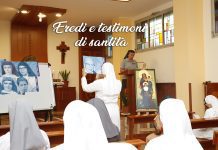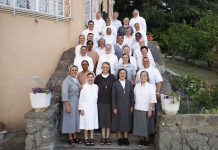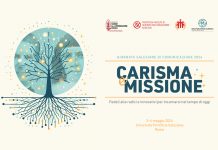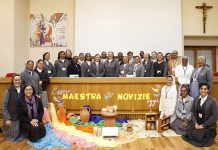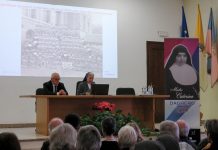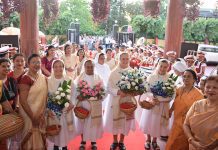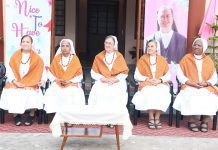“The Councilor for formation animates and promotes the integral and ongoing formation of the Daughters of Mary Help of Christians with regard to the values and needs of our specific vocation in the Church. She will devote particular attention to the period of initial formation.” (C. 128)
Councilor for Formation
Sr. Nilza Fátima de Moraes
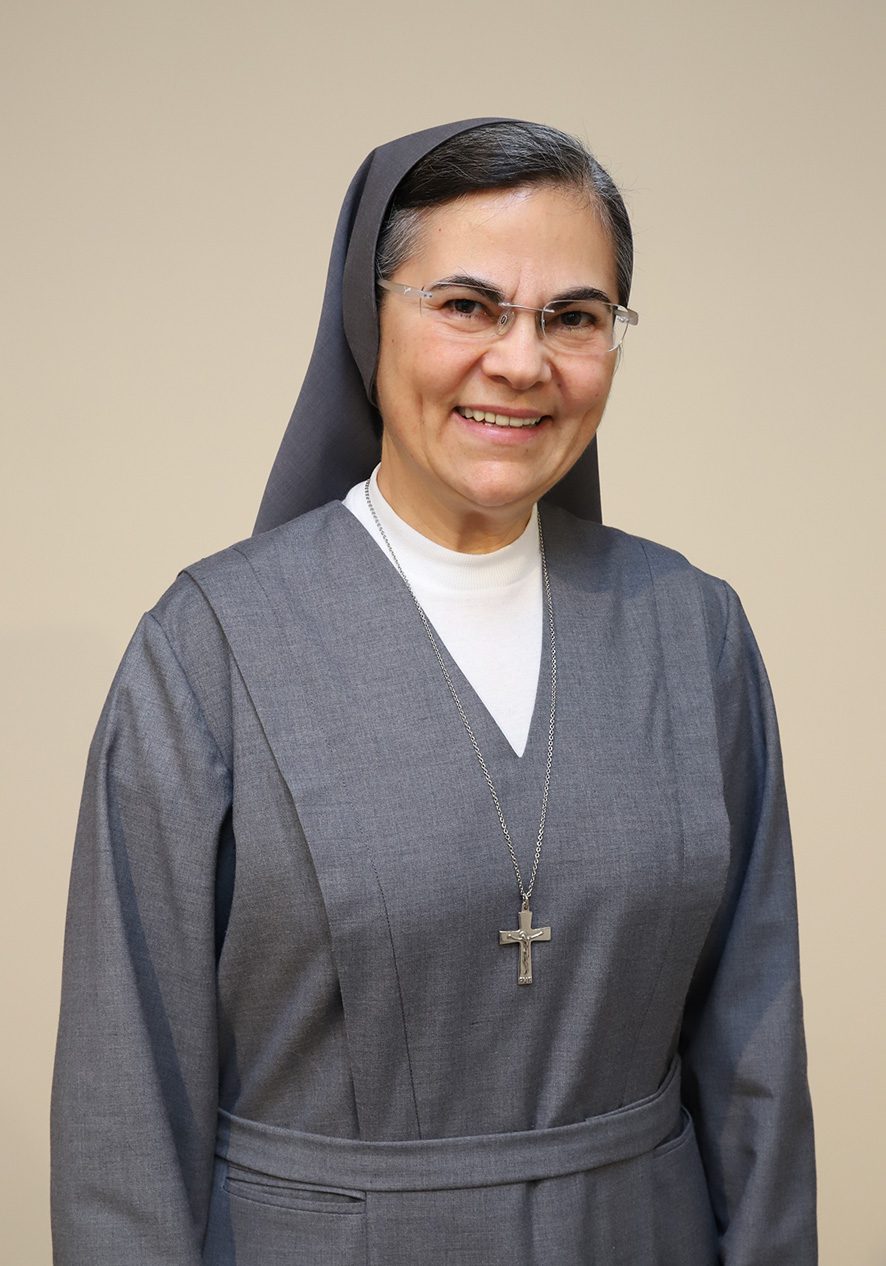 She was born on 25 November 1965, in Natividade da Serra – San Paolo, a municipality in the Vale do Paraíba region (Brazil).
She was born on 25 November 1965, in Natividade da Serra – San Paolo, a municipality in the Vale do Paraíba region (Brazil).
At the beginning of her adolescence in 1979, she went to study in Lorraine, together with her sister Marilza, at the so-called Domestic School with the Salesian Sisters, who resided and worked in St. Joseph retirement home for the FMA. There she receives the human and spiritual care of the sisters, participates daily in the Eucharistic Celebration, in singing rehearsals twice a week, in domestic activities, and on Sundays at the San Luigi Oratory, a space where children played, practiced sports, had a snack, and took part in the catechesis organized by the FMA and the Salesians of Don Bosco.
Between 1979 and 1981, she participated monthly in vocational meetings in Our Lady of Carmel School, Guaratinguetá, where in 1982 she lived the time of vocational discernment.
In 1981 she began her formation as an aspirant in the Institute of the Daughters of Mary Help of Christians in San Paolo.
In 1985 she began the stage of the Novitiate and on 24 January 1987 she made her Religious Profession and was sent to the Community of Santa Inés in San Paolo.
During temporary vows, from 1987 to 1993, the year in which she made her perpetual vows, she lived in three communities, followed a course in pedagogy, and exercised various functions in the school, in the oratory, and in student youth ministry.
In 1994 she went to live in the House of Formation – Aspirants / Postulants in the Perdizes district of São Paulo as a member of the Formation Team and worked in the Institute of Nossa Senhora Auxiliadora in Belenzinho.
Since 1998, still residing in the Aspirantate, she works in Santa Inés School until the first semester of 2000. During the second semester, she goes to Rome to take a Catechesis Course at the Faculty of Education “Auxilium” and stays there for a period of three and a half years.
At Christmas 2004, she returned to Brazil and worked in various communities as a teacher of Religious Education, Coordinator of Youth Ministry, Animator of Communities and Schools, Formator of Aspirants and Postulants. She also teaches liturgy and catechesis.
From 2008 to 2013 she was Provincial Councilor, from 2014 to 2020 she was Provincial Vicar, and in 2021 she was appointed Provincial of the Brazilian Province of Our Lady of Aparecida (BAP).
On 7 October 2021, on the memorial of the Blessed Virgin Mary of the Rosary, during the XXIV General Chapter, she was elected Councilor for Formation.
In the animation of the Sector Sr. Nilza Fátima de Moraes has as collaborators:
- Sr. Anelfreda Miranda
- Sr. Charlotte Bizige Nirere
- Sr. Monika Golianová
- Sr. Elena Massimi
- Sr. Maria Dolores Ruiz Pérez (Coordinator Project Jerusalem)
- Sr. Jeanette Beatrice Palasota (Coordinator Project Mornese)
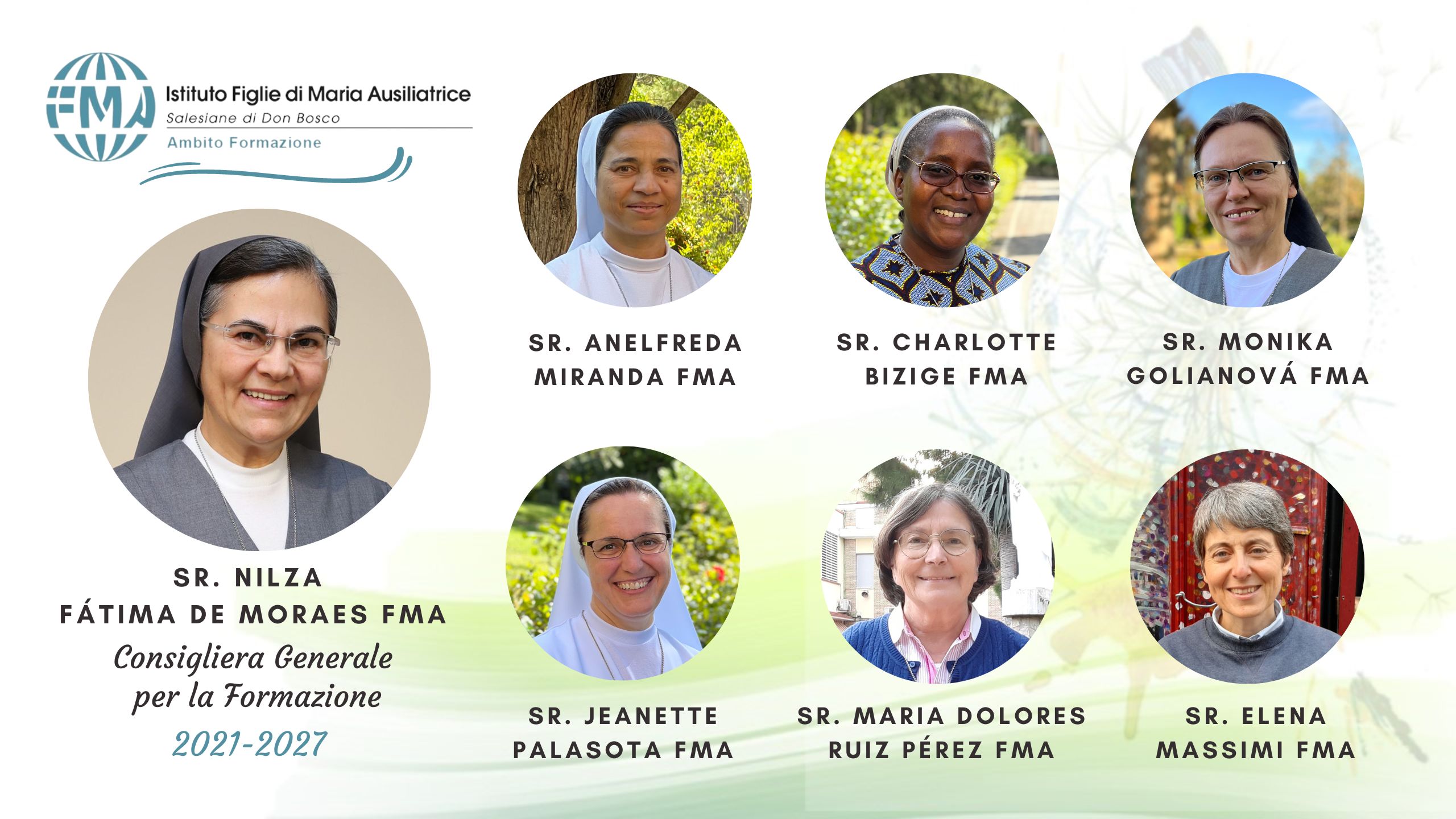

Formation finds its foundation in the plan of the Father who, through the Spirit, wants to make us “conformed to the image of his Son in order that He might be the firstborn within a large family.”
In our life as FMA, formation assumes the characteristics of the specific experience of the Holy Spirit that Don Bosco and Mother Mazzarello transmitted to us, and which we personally and in community have the duty to live and develop in harmony with the Body of Christ which is in continual growth (C 77).
The aim of Formation is the maturing of the whole person in a gradual, progressive configuration to Christ, Apostle of the Father, according to the plan of life outlined in the Constitution (C 78).
Formation is above all the work of the Holy Spirit; as such it requires listening, docility, collaboration.
Our model and guide in this fundamental attitude is Mary, Most Holy, mother and educator of every Salesian vocation. In her we find a living presence, and the help to direct our lives decisively to Christ and to make our personal relationship with Him ever more authentic (C79).
The Institute entrusts the animation of this process to the Formation Sector.
The Councilor for Formation, together with her team, animates and promotes ongoing and initial formation, in fidelity to the charism and to the specific needs of the various contexts.
The Sector commits itself to assume a style of animation that promotes vocational unity and the quality of our educational mission.
It carries out coordination for communion through reflection and research, in collaboration with the other Sectors and with the visiting Councilors in the style of synodality.
Particular care is taken of the formators so that, in fidelity to the criteria dictated by the needs of the charism, they can be accompanied in their itinerary of growth, in the vital assumption and implementation of the ministry entrusted to them, also through formative proposals offered by the Sector.
It promotes the inculturation of the Plan of Formation, taking into account the internationality of the presences and the intercultural face of the communities.
It animates the Institute so that every FMA may revitalize the Covenant of love, rediscover vocation as an experience of encounter with God, and with the strength of the Holy Spirit, lives docibilitas as an openness to let oneself be formed by life, by encounters, by every existential situation.
It assumes the logic of ‘feeling’, of being an ‘outgoing community’ and networked, and Integral Ecology as a dimension of life and of the educational mission.
The Formation Sector places itself on the horizon of the Programming of the six-year period:
“Do whatever He tells you” (Jn 2:5)
As at Cana and Mornese
“We are a Presence”
that generates, promotes, and
takes care of life in contemporaneity.
In fidelity to the requests that come from the chapter reflection it chooses to:
- revive and bear witness together to the beauty of the Salesian vocation by placing oneself in a state of continuous formation for a renewed vocational impetus;
- assume missionary Synodality as a lifestyle that generates new ways of participation, animation, and government;
- listen to the cry of the young, the poor, and the earth, to make courageous evangelical choices as networked educating communities from the perspective of Integral Ecology.
Specific processes and objectives of the Sector
- CENTRALITY OF CHRIST: Where is your heart? (Mt 6:21)
- Reawaken the choice of the centrality of Christ in one’s life.
- Mature in the ability to love one another and to love with interior freedom.
- LISTENING PRESENCE
- Listening to and responding to the question of formation today, for a renewed vocational impetus.
- Involving the FMA to identify strategies that promote understanding of the new way of conceiving ongoing and initial formation.
- Listening to the FMA and the young women in formation to arrive at a shared representation of formation that transforms, oriented towards outlining concrete and enculturated itineraries together.
- PRESENCE THAT ACCOMPANIES
- Give continuity to the processes begun in the last six years to encourage their responsible assumption by every FMA and community.
- Guidelines for the formative period of Temporary Vows.
- The personal Encounter.
- Guidelines for the formation of the new animators.
- The Coordinator for formation.
- Guidelines for the Evaluation of the formative itinerary and Report on the young person in formation.
- Inculturation of formation for autochthonous and indigenous vocations.
- Guidelines on the presence of the FMA in social networks.
- Give continuity to the processes begun in the last six years to encourage their responsible assumption by every FMA and community.
- WITH EYES TURNED TO JERUSALEM AND MORNESE
- Redesign and propose Project Mornese as an opportunity for a new vocational impulse.
- Redesign and propose Project Jerusalem as an experience of encountering the Word and deepening the biblical roots of the charism also in view as an educating community, of accompanying young people in their encounter with the Word of God.


